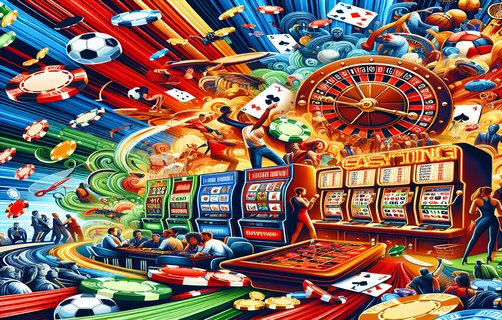Mastering the Poker Table: Navigating Strategy and Emotion
पोकर टेबल पर महारत: रणनीति और भावना का संचालन
Poker is more than just a game of cards; it’s a complex interplay of strategy, psychology, and chance. Understanding the intricacies of poker not only involves knowing the rules but also developing a flow in your gameplay, evaluating your opponents, maintaining emotional composure, and addressing betting strategies effectively. This article delves into the multifaceted aspects of poker, providing insights that can transform a casual player into a formidable opponent.
**Flow Planning**
In any poker game, flow planning is essential. It refers to how one manages their strategy throughout the game by adjusting to the ongoing dynamics at the table. Effective flow planning involves making informed decisions based on your hand strength, your opponents’ tendencies, and the game phase. This means knowing when to be aggressive, when to tighten your gameplay, and how to exploit other players’ weaknesses.
**Game Flow Evaluation**
Game flow evaluation is a continuous process. Throughout a poker session, players should regularly assess their own performance and the dynamics of the table. Are opponents playing conservatively or aggressively? Are players bluffing more frequently? These evaluations inform your decisions, allowing you to shift strategies effectively. Observing changes in game flow and adapting accordingly is key to maintaining an edge.
**Emotional Composure**
Poker can be an emotional rollercoaster. Maintaining emotional composure is crucial for success. Losing a hand can lead to tilt, which may cause recklessness and poor decision-making. Players should develop techniques to manage their emotions, such as taking deep breaths, stepping away for a moment, or using positive affirmations to regain focus. Remember, a calm player is often more formidable, able to think clearly and make calculated bets.
**Reaction Observation**
Being observant is a vital skill in poker. Reaction observation involves paying attention to not just the cards being played, but also to the physical tells that opponents may inadvertently display. Are they leaning forward when they have a strong hand? Do they fidget when bluffing? Developing the ability to read these signs can give you an upper hand, allowing you to adjust your strategies to exploit opponent weaknesses effectively.
**Short-term Goals Focus**
Focusing on short-term goals during a poker session helps maintain motivation and clarity. Rather than fixating solely on winning, set practical objectives for each session, such as mastering a specific strategy or improving your observational skills. Tracking progress toward these goals provides a sense of accomplishment and maintains a positive mindset throughout the game.
**Risk Estimation Methods**
Risk estimation methods are crucial in determining how much to bet in various situations. Players should evaluate their hand strength, the odds of improving their hand if they continue to play, and the potential risks posed by opponents. Learning to calculate pot odds and implied odds is beneficial in making informed betting decisions, balancing the potential rewards against the risks involved.
**Betting Missteps Management**
All players make betting missteps at some point; the key is managing them effectively. Acknowledge your mistakes without becoming overly harsh on yourself. Reflect on what went wrong and develop strategies to avoid similar errors in the future. This proactive approach will create an environment of continuous improvement, enhancing both confidence and skill in your poker game.

In conclusion, mastering poker requires a combination of strategic planning, emotional management, and adaptive gameplay. By focusing on flow planning, game flow evaluation, emotional composure, reaction observation, short-term goal focus, risk estimation methods, and effective betting missteps management, players can significantly improve their performance at the poker table. As poker continues to thrive as a popular pastime, adopting these insights may determine whether you’re just another player or a strategic professional ready to conquer the table.
पोकर सिर्फ एक कार्ड का खेल नहीं है; यह रणनीति, मनोविज्ञान और मौके का एक जटिल अंतःक्रिया है। पोकर की बारीकियों को समझना केवल नियमों को जानने तक ही सीमित नहीं है, बल्कि आपके गेमप्ले के प्रवाह को विकसित करने, आपके विरोधियों का मूल्यांकन करने, भावनात्मक संकोच बनाए रखने और प्रभावी ढंग से सट्टेबाजी रणनीतियों को संबोधित करने के लिए भी है। यह लेख पोकर के विभिन्न पहलुओं की खोज करता है, ऐसे अंतर्दृष्टि प्रदान करता है जो एक आकस्मिक खिलाड़ी को एक मजबूत प्रतिद्वंद्वी में बदल सकती हैं।
प्रवाह योजना
किसी भी पोकर खेल में, प्रवाह योजना बहुत महत्वपूर्ण है। यह उस तरीके को संदर्भित करता है जिस पर कोई अपने खेल की रणनीति का प्रबंधन करता है, जबकि टेबल पर चल रही गतिशीलता के अनुरूप समायोजन करता है। प्रभावी प्रवाह योजना में आपके हाथ की ताकत, आपके विरोधियों की प्रवृत्तियों, और खेल के चरण के आधार पर सूचित निर्णय लेना शामिल है। इसका मतलब है कि जानना कब आक्रामक बनना है, कब अपने गेमप्ले को कसना है, और कैसे अन्य खिलाड़ियों की कमजोरियों का उपयोग करना है।
गेम फ्लो मूल्यांकन
गेम फ्लो मूल्यांकन एक निरंतर प्रक्रिया है। एक पोकर सत्र के दौरान, खिलाड़ियों को लगातार अपनी खुद की प्रदर्शन और टेबल की गतिशीलता का आकलन करना चाहिए। क्या विरोधी सतर्क या आक्रामक खेल रहे हैं? क्या खिलाड़ी अधिक बार धोखा दे रहे हैं? इन आकलनों से आपके निर्णयों को सूचित करने में मदद मिलेगी, जिससे आप प्रभावी ढंग से रणनीतियों को बदल सकें। गेम फ्लो में बदलावों को देखने और तदनुसार समायोजित करना मुख्य कुंजी है।
भावनात्मक संकोच
पोकर एक भावनात्मक रोलरकोस्टर हो सकता है। भावनात्मक संकोच बनाए रखना सफलता के लिए महत्वपूर्ण है। एक हाथ हारने से टिल्ट हो सकता है, जो लापरवाह और खराब निर्णय लेने का कारण बन सकता है। खिलाड़ियों को अपनी भावनाओं को प्रबंधित करने के लिए तकनीकों का विकास करना चाहिए, जैसे कि गहरी सांस लेना, एक पल के लिए पीछे हटना, या सकारात्मक पुष्टि का उपयोग करना जिससे आप ध्यान केंद्रित कर सकें। याद रखें, एक शांत खिलाड़ी अक्सर अधिक मजबूत होता है, जो स्पष्ट रूप से सोचने और गणनात्मक बेट लगाने में सक्षम होता है।
प्रतिक्रिया अवलोकन
ध्यान देने की क्षमता एक महत्वपूर्ण कौशल है। प्रतिक्रिया अवलोकन में केवल खेले जा रहे कार्डों पर ध्यान देना नहीं है, बल्कि उन शारीरिक संकेतों पर भी ध्यान रखना है जो विरोधियों ने अनजाने में दिखा सकते हैं। क्या वे मजबूत हाथ होने पर आगे झुकते हैं? क्या वे धोखा देते समय बेजोड़ होते हैं? इन संकेतों को पढ़ने की क्षमता विकसित करने से आपको ऊपरी हाथ मिलेगा, जिससे आप दीखते हुए कमजोरियों का उपयोग करने के लिए अपनी रणनीतियों को समायोजित कर सकेंगे।
अल्पकालिक लक्ष्यों पर ध्यान केंद्रित करना
एक पोकर सत्र के दौरान अल्पकालिक लक्ष्यों पर ध्यान केंद्रित करने से प्रेरणा और स्पष्टता बनाए रखने में मदद मिलती है। जीत पर ध्यान केंद्रित करने के बजाय, प्रत्येक सत्र में व्यावहारिक उद्देश्य निर्धारित करें, जैसे कि एक विशिष्ट रणनीति में महारत हासिल करना या अपने अवलोकन कौशल में सुधार करना। इन लक्ष्यों की दिशा में प्रगति को ट्रैक करना एक उपलब्धि की भावना प्रदान करता है और खेल के दौरान सकारात्मक मानसिकता बनाए रखता है।
जोखिम आकलन विधियाँ

जोखिम आकलन विधियाँ विभिन्न स्थितियों में कितनी मात्रा में सट्टा लगाए जाने का निर्धारण करने में महत्वपूर्ण होती हैं। खिलाड़ियों को अपनी हाथ की ताकत, अपने हाथ को सुधारने की संभावनाओं और विरोधियों द्वारा पेश किए गए संभावित जोखिमों का मूल्यांकन करना चाहिए। पॉट ऑड्स और इम्प्लाइड ऑड्स की गणना करना सिखना सट्टेबाजी के उचित निर्णय लेने में सहायक है, जो संभावित पारिश्रमिक को शामिल जोखिमों के खिलाफ संतुलित करते हैं।
सट्टेबाजी की गलतियों का प्रबंधन
सभी खिलाड़ी किसी न किसी बिंदु पर सट्टेबाजी की गलतियाँ करते हैं; कुंजी उन्हें प्रभावी ढंग से प्रबंधित करना है। अपनी गलतियों को स्वीकार करें बिना खुद पर बहुत कठोर हुए। सोचें कि क्या गलत हुआ और भविष्य में समान गलतियों से बचने के लिए रणनीतियों का विकास करें। यह सक्रिय दृष्टिकोण निरंतर सुधार के एक वातावरण का निर्माण करेगा, जिससे आपके पोकर खेल में आत्मविश्वास और कौशल में वृद्धि होगी।
अंत में, पोकर में महारत हासिल करने के लिए रणनीतिक योजना, भावनात्मक प्रबंधन, और अनुकूलित खेल शैली के संयोजन की आवश्यकता होती है। प्रवाह योजना, गेम फ्लो मूल्यांकन, भावनात्मक संकोच, प्रतिक्रिया अवलोकन, अल्पकालिक लक्ष्यों पर ध्यान केंद्रित करना, जोखिम आकलन विधियों, और प्रभावी सट्टेबाजी गलतियों का प्रबंधन पर ध्यान केंद्रित करके, खिलाड़ी पोकर टेबल पर अपने प्रदर्शन में महत्वपूर्ण सुधार कर सकते हैं। जैसे-जैसे पोकर एक लोकप्रिय शौक के रूप में बढ़ता है, इन अंतर्दृष्टियों को अपनाने से यह निर्धारित हो सकता है कि आप केवल एक अन्य खिलाड़ी हैं या एक रणनीतिक पेशेवर हैं जो टेबल पर विजय प्राप्त करने के लिए तैयार हैं।

comments
AceKingFan
This article really highlights the psychological side of poker which is often overlooked.
PokerGuru99
Great tips on maintaining emotional composure. Definitely important for high-stakes games!
StrategicBettor
Risk estimation methods were insightful; I’ll be applying them in my next game.
TiltMaster
I wish I had read this before my last sessions! Emotional control is key.
BluffingBeast
The section on reaction observation is a game changer for understanding opponents.
BettingPro
Short-term goals focus is something I’ll implement immediately for improved gameplay.